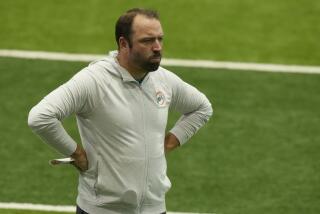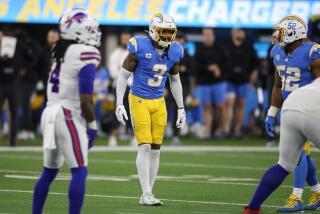He Doesn’t Want to Go First to Worst
- Share via
NEW YORK — As the worst team in football, the San Diego Chargers have the No. 1 selection in this weekend’s NFL draft.
Mississippi quarterback Eli Manning has one hope: that the Chargers don’t pick him.
Manning, the younger brother of Indianapolis Colt quarterback Peyton Manning, has advised the Chargers through his agent that he does not want to play for them.
At the request of the Chargers, Archie Manning, the former NFL quarterback and father of Peyton and Eli, met with team President Dean Spanos in Mississippi last week, then visited San Diego this week. None of that swayed him -- or his son.
Archie then flew to New York, where he arrived late Wednesday and learned that Charger General Manager A.J. Smith had told reporters that Eli didn’t want to be a Charger and would prefer playing for the New York Giants.
The situation evoked memories of the 1983 draft, when Stanford quarterback John Elway was selected first by the Colts, then still in Baltimore -- even though he had told them he didn’t want to play for them -- then was traded to Denver after threatening to give up football for a baseball career.
Archie Manning, with his sons at his side, told reporters Thursday how the San Diego situation had unfolded, and emphasized two points: He hadn’t thrust himself into the negotiations, the Chargers had approached him; and, he said, neither he nor agent Tom Condon ever said Eli wanted to play for the Giants.
Archie Manning also expressed frustration that Smith had confirmed to reporters what Manning believed were private conversations.
“I would have preferred to hear from A.J.,” said Manning, who with his sons spoke to reporters at a promotional event in Manhattan. “I told A.J. from the get-go, ‘I hate this. I really hate this. I don’t want the Chargers to be exposed in a negative way. I don’t like it for our family. I don’t like it if it’s anything that’s detrimental to this league.’
“I’ve been involved with the NFL a long time. I respect the people at the top, throughout the administration, players, coaches. I hate to dampen that with the decision we made. I was surprised. I wish we could have done this behind the scenes.”
Asked if he would be happy if the Chargers made Eli the No. 1 pick Saturday, Archie said flatly, “No.”
Manning would not say whether his son would refuse to report to the Chargers if they drafted him, nor would he give specifics on why the Chargers were not the team for Eli.
“As I said, just a lot of factors from talking to a lot of people, a lot of people that wear different hats involved in this game,” he said. “I certainly wouldn’t want to name them or expose them. Then the decision was made by Tom, Eli and other people.”
Smith, overseeing his first draft as Charger general manager, declined to comment for this story.
NFL Commissioner Paul Tagliabue told The Times that Spanos had called him last week, informing him that the Chargers planned to select Manning, and asked Tagliabue to help set up a meeting with Archie Manning. Tagliabue said he did so, although he didn’t act as mediator.
“I made it clear to both of them that I was putting it together, [but] they had to have the conversations,” Tagliabue said.
The Giants have the fourth selection Saturday and have talked to San Diego about trading up to the top spot to land Manning, the fifth quarterback in Southeastern Conference history to throw for more than 10,000 yards. Cleveland, which might trade up from the seventh spot, also is said to prefer Manning over the other two top quarterback prospects, Philip Rivers of North Carolina State and Ben Roethlisberger of Miami of Ohio.
The Chargers have missed the playoffs eight consecutive seasons, the league’s second-longest drought. Although Archie Manning never made the playoffs in 11 seasons with the New Orleans Saints, he insisted this was not a case of a father reluctant to see his son go through the same thing.
“If you’re an early pick, you’re probably going to go to a struggling franchise,” he said. “There’s no rose garden out there for a quarterback going into this league. I asked Eli this morning, ‘They’re going to ask you who you prefer to play for.’
“He’s never answered that. And he said, ‘You know, I really prefer to play for the Patriots or the Colts, but it doesn’t look like that’s going to work.’ It’s a struggle for the young quarterback.”
Eli followed in the footsteps of his father at Ole Miss, setting 45 school records -- 27 of which had been held at one time by his dad -- and helping revive a football program that had fallen out of fashion. Since his arrival five years ago, Ole Miss season-ticket sales have increased by about 60% from roughly 26,000 in 1998 to more than 42,000 in 2003.
He spoke only in generalities about the San Diego situation, allowing his father to explain how the events transpired. As for the draft, he said he didn’t have his heart set on being the No. 1 selection and was trying not to dwell on what might happen.
“Right now, I’m not worried,” he said. “I’m trying to make the best of this whole situation. I’ve been working hard for Saturday. I’m excited for the next couple of days, and we’ll see what happens.”



